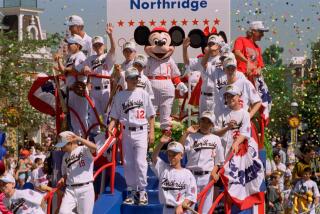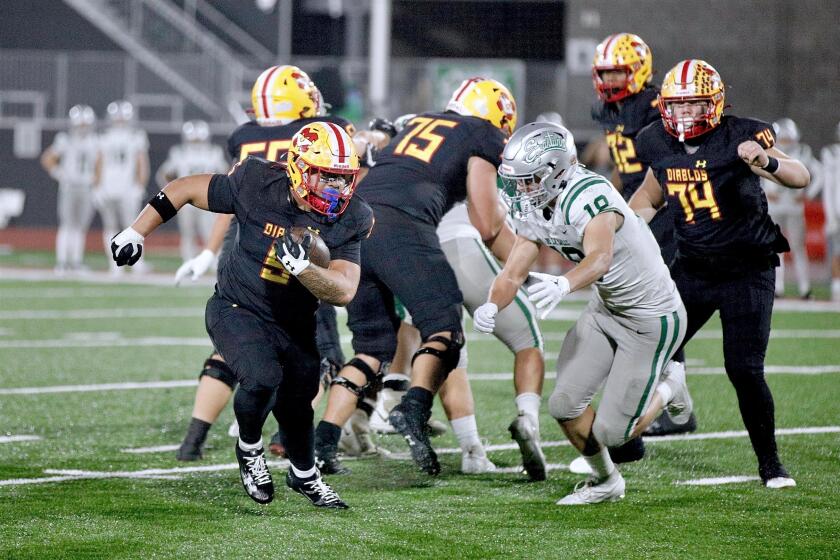For many kids, sports is serious business indeed. With pressures from parents and coaches beginning early, it’s . . . : All Work, No Play
CHICAGO — Eleven-year-old Davey Knickerbocker loves baseball. Loves it more than anything in the world. He’s a catcher for a Palatine, Ill., youth all-star team, and heaven to him is playing ball the whole day, every day.
That’s what he used to think, anyway.
In 1990, he made the Palatine Travelers, an elite team of 10- to 12-year-olds separate from the town’s Little League. The Travelers play all-star squads from the suburbs of Chicago and drive to tournaments in neighboring states. The year Davey joined the squad, they played 115 ballgames--sometimes four in a day, with one day off a week.
“At the end of that season I was so tired,” he recalls, “I went a couple of weeks without even wanting to look at my baseball glove. It was funny. I had never felt like that before.”
His 1991 schedule proved even more arduous. During a four-month season that concluded in mid-August, the Travelers played a whopping 160 ballgames--an average of four every three days.
“We’re all beat,” Davey confessed near the end of the season. “You don’t groan when you think about the next game, but you don’t really enjoy it either.”
Still, he is planning on one final year with the Travelers. He will be 12 this summer, a team leader, and is anxious for his “season in the sun.” But he is already dreaming about the all-star team he’ll try out for when he turns 13.
“They play only 75 games,” he says enthusiastically. “I’ll be able to take some time off and do all the things I couldn’t do (last) summer, like going to the movies, hanging out at the pool more and seeing my friends.”
In suburbs across the United States, including those of Los Angeles, Davey Knickerbocker’s sports involvement isn’t seen as unusual or even excessive. He is one of tens of thousands of suburban preteens playing for highly competitive, local “travel” teams in baseball, basketball, hockey and soccer. Some of these kids play schedules as taxing as the professionals’.
Sports are thought of as the yellow brick road of escape for inner-city children, but the wealth and prestige showered on professional athletes tempt almost any parent when a coach hints his or her child has a chance for real athletic success.
Some parents go to extraordinary lengths to see those dreams through. In Anaheim, Calif., Dick Dostal, a 47-year-old aircraft mechanic, has arranged for his daughter to train 1 1/2 hours a day--six, sometimes seven days a week, 52 weeks a year--in hopes that she will win a college soccer scholarship. His daughter, Annabel, is 13. She has followed this regimen since turning 3.
“In the last year, I don’t think she has gone more than two days without playing soccer,” Dostal says.
In nearby Orange, 13-year-old Nicole Terry plays competitive basketball, volleyball and soccer 50 weeks a year. On a typical Saturday, her parents will drive her to San Bernardino for 9 a.m. and 11 a.m. soccer games, and then to East Los Angeles College for six volleyball matches that last until 8:30 p.m.
“Sometimes during the week, I get home from practice at 9 or 9:30 (p.m.), and I’m too tired to do my homework,” Nicole says. “Then I do bad at school the next day.”
Nonetheless, says her mother, Kathryn, an attorney, “At this age, Nicole has to get real serious if she wants to win a full-ride (college) scholarship. We’ve decided that she will probably have to drop soccer this year so she can concentrate on basketball and volleyball, where there are more scholarships available.”
Nicole is disappointed. Soccer is her favorite sport.
The demands placed on children begin even earlier than most people suspect. Twelve-year-old Neil Williams, Davey Knickerbocker’s teammate, played his first 50-game baseball season when he was 9.
Around Chicago’s northwest suburbs, no team plays more games than the Travelers, nor does any carry greater prestige. Just 13 boys from the Palatine Park District, which includes parts of four other neighboring suburbs, made the team last year. (A total of 450 other Palatine 11- and 12-year-olds played house-league baseball.) The Travelers also recruited three players from outside their park district to make their team as strong as possible.
Pitcher Ryan Ritt, 12, recalls the night he made the squad: “It was a big honor. When the coach told me, I had tingles going all through me.”
Ryan, like many of his teammates, hoped the Travelers would be his first step toward playing high school ball and possibly making the pros. A key to his success, he believed, would be the Travelers’ founder and coach, Tom Matsie, a Lake Zurich, Ill., restaurateur.
Matsie, one of the area’s most knowledgeable youth-league instructors, has compiled a phenomenal nine-year record with the team. His 1991 club finished 137-22-1.
The 40-year-old coach runs a tight ship. During baseball season, there is not a night he doesn’t coach or scout a game, and he expects a similar commitment from his players. The Travelers began indoor practice in January. They moved outdoors for two-hour-a-day, five-day-a-week workouts in March. They started playing in April, and from now until mid-August, they will work at baseball six, sometimes seven, days a week.
Matsie’s emphasis is very much on winning. The players learn that immediately.
“When we won, (Matsie) loved it. When we lost, we’d get upset and he’d get very upset,” recalls Joe Chambers Jr., who played for the team three years ago. “He was a tough coach. He’d get pretty mad if you made an error or struck out.”
Last season, it was not unusual for the Travelers to play four games on Saturday, followed by another four games on Sunday. On occasion, they played school-night doubleheaders that kept them out until midnight.
“I know kids who were doing their homework in their cars,” says one parent. “That’s the only time they had to do it.”
“Sometimes it’s like a job,” says player Neil Williams.
But few players or parents complain because Matsie improves the players’ games, sometimes significantly.
“Take (12-year-old first baseman Kevin) Maher,” says Holy Cross High School varsity baseball coach Frank Mariani, who attended some of the Travelers’ games. “At the beginning of the season, he looked awkward. He was like a truck getting out of the batter’s box. But now he’s got some speed, and he’s swinging the bat. Matter of fact, I’d like to recruit some of these kids.”
That is the dream. “I told my son (before the season), ‘This is boot camp,’ ” says Neil Williams’ father, Larry. “I told him, ‘This is one year out of your life. You’ll get the fundamentals you’ll need (to play high school ball).’ ”
That dream, though, comes at considerable personal cost. Because of the hours they put in on the field, the players effectively forfeit their social lives. Early on, they discover that they have no time for movies, for hanging out, even for visiting their oldest friends. They simply have no time to be 12-year-olds.
“At this age,” says Kevin Maher’s mother, Paula, “kids like to have sleep-overs. But that stopped in our house because of baseball. Kevin needs his sleep so he can be ready to play the next day. Groups of boys come to our front door asking if he wants to come out to play, but he hardly ever can--again, because of baseball. It’s a good thing he’s made friends on the team, because his old friends have given up on him.”
Larry Williams agrees. His son, he says, “doesn’t have time to hang out at the mall with his friends.”
Neither does Davey Knickerbocker. He says that last summer, he didn’t see his closest friend from the time school ended until mid-August. “I called him,” he recalls, “because for the first time, we had two days off in a row. He thinks I’m crazy for playing so many games. A lot of people think I’m crazy.”
The question arises: What is too much? Are 160 baseball games or 11 straight months of hockey excessive for a 12-year-old?
Some parents and coaches argue that even without travel teams, their kids would be playing ball every day. They also point out that sports keep their children out of trouble and off the streets.
“If the pressure was so immense,” argues Vince DiVarco, whose son plays for both the Eagles and the Travelers, “all these kids would be having big-time problems. But they’re not.”
“I’ve never gotten from my players that they missed out on too much in order to play baseball,” Matsie adds. “I see them going on to high school and doing well. So I don’t know what is too much.”
The two have a point: In nine years, just three players have quit the Travelers.
But the issue appears more subtle than that. The numbingly long seasons cause many children to lose their enthusiasm. The grind of baseball day after day wears them down and the games lose their meaning.
Twice last summer, for example, the Travelers played Park Ridge, Ill. “The first time we played them, early in the season, they looked real good,” recalls Park Ridge second baseman Joe Farinella. “But when we played them again two months later, they didn’t look the same. They looked tired. They weren’t cheering or anything.”
Even Matsie admits that “during the week, it’s hard to get (my players) up for games. Sometimes their attention wanders. It’s the weekend tournaments that get them focused.”
Child psychologists are wary of such exhaustive schedules and of the unyielding pressures that accompany them. They question whether teams such as the Travelers provide healthy environments for preteens.
“Play is very important to children developmentally. But when an activity turns obsessive, it is no longer play. It is work,” cautions Dr. Van Dyke DeGolia, an assistant clinical professor of psychiatry at the UCLA School of Medicine.
Dr. Loren Woodson, a West Los Angeles child and adolescent psychiatrist, adds: “The kind of kid for whom such programs have value is the kid who doesn’t have much positive going on in his life--a kid without a father, for example. And even then, if the team mainly serves the needs of the coach, the kid will end up feeling enslaved.”
Theirs is a moot point, however. Each year, more and more suburban communities sponsor travel teams and make them available to increasingly younger children.
“It’s a problem that’s only going to get worse,” predicts Harvey Meyers, president of the Bronco division of Wilmette’s Little League.
Denny Porter, who in 1970 organized one of the northwest Chicago suburbs’ first baseball travel teams, also worries about the nationwide proliferation of travel teams.
“That first year,” recalls Porter, a 45-year-old Motorola Corp. field inventory manager, “there were articles in the local paper. ‘How dare you take kids from the Little League and subject them to so much pressure?’ they said. Well, traveling teams are now the standard in almost every community.”
Sometimes, it is not the players who suffer most.
Mike Kowalczyk, 40, coached a Schaumburg, Ill., youth baseball team that played 74 games last summer and consumed 35 hours a week of his time. Kowalczyk saw plenty of his 12-year-old son, Eddie, who played on the squad, but had less time for his two other kids.
“One day my 10-year-old son came up to me and said, ‘Dad, I play, too. Can you come and see me?’ ” Kowalczyk says. “That hurt me. It would hurt any parent. It hurt my heart. I told him, ‘When Eddie’s gone from the team, I’ll come back and coach you.’ You try to explain it, but they don’t really understand.”
More to Read
Go beyond the scoreboard
Get the latest on L.A.'s teams in the daily Sports Report newsletter.
You may occasionally receive promotional content from the Los Angeles Times.










